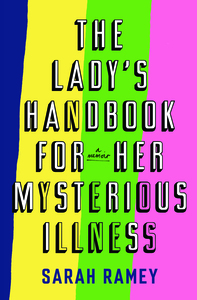You need to sign in or sign up before continuing.
Take a photo of a barcode or cover
challenging
emotional
informative
inspiring
sad
slow-paced
"Empathy is about the strength it takes to go down into the dark." I was expecting a memoir about chronic illness and instead this book is a manifesto. Modern diet, environment and stress factors are profoundly unhealthy and autoimmune disease is a ringing alarm bell we need to heed.
Graphic: Medical trauma
challenging
informative
tense
fast-paced
This book is one that I heard Ann Patchett booktalk on Instagram as a book that she’s given more copies away in her personal life than any other. I can see why. It was a page turner, and an account of the frustrating health journey that too many of us have experienced with an undiagnosable illness.
Are there problems with this book? Yes. Ramey is privileged and has access to family support and financial resources, plus both of her parents are physicians.
It could have used more editing. This is sprawling and organized in such a way that it’s hard to flip back and find a previous section to reread When she talks about the issue of gut dysbiosis as less of a problem in developing countries “where they consume fewer grains” I was like WHAT?! Sure maybe they consume less refined and processed food, less refined sugar, but no no way on the grains. An editor should have spotted this. Which made me question some of the other things she states as facts.
The acronyms needed a glossary.
It’s a memoir, so no footnotes, but I wanted to be able to reference some of the information sources and studies she consulted in her research.
Are there problems with this book? Yes. Ramey is privileged and has access to family support and financial resources, plus both of her parents are physicians.
It could have used more editing. This is sprawling and organized in such a way that it’s hard to flip back and find a previous section to reread When she talks about the issue of gut dysbiosis as less of a problem in developing countries “where they consume fewer grains” I was like WHAT?! Sure maybe they consume less refined and processed food, less refined sugar, but no no way on the grains. An editor should have spotted this. Which made me question some of the other things she states as facts.
The acronyms needed a glossary.
It’s a memoir, so no footnotes, but I wanted to be able to reference some of the information sources and studies she consulted in her research.
challenging
dark
emotional
funny
hopeful
informative
inspiring
sad
slow-paced
dark
emotional
informative
inspiring
sad
medium-paced
hopeful
informative
reflective
slow-paced
challenging
informative
slow-paced
Hard to rate this one. I don’t think I was the ideal audience for this so it felt kind of preachy—although I imagine if you were dealing with some of these symptoms it might feel like a revelation.
informative
sad
slow-paced
This is Ramey’s experience as a white, cis, economically privileged female who’s been misdiagnosed, gaslighted, and ignored for years. It’s appalling. She inserted one-sided social commentary, but memoir has no rules. It’s not touted as an in-depth study on how shitty the US healthcare industry is to marginalized individuals. That book would be the thickest ever written. That aside, the writing is meh, and it could’ve been half the length.
challenging
dark
emotional
hopeful
informative
reflective
medium-paced
emotional
informative
medium-paced
I feel for this woman and her journey but she desperately needs to read Christy Harrison and also check out Mind Your Body by Nicole Sachs. It sucks our medical system does such a terrible job at screening for (or even recognizing) disordered eating, as well as so fundamentally misunderstands psychosomatic illness (a REAL thing with REAL symptoms that isn’t “all in their heads” and isn’t going to be helped AT ALL by an antidepressant, because antidepressants don’t address what needs to be addressed there). Too bad this lady didn’t seek out or wasn’t ever referred to a therapist who actually SPECIALIZES in treating psychosomatic presentations—it’s a totally different framework and skill set, one that a normal therapist just isn’t going to have. Anyway. When it became clear she was going to be advocating for strict dieting and “lifestyle” changes I just…could not keep on keeping on. SO MANY GI issues are actually CAUSED by restrictive diets. Yes, our system sucks at addressing the conditions she mentions, which have largely been dismissed because they predominately impact women, and that is awful, and has opened the door for the “wellness” industry to make a boatload of money selling pseudoscience to so many people almost willing to be duped because they’re so desperate for answers. I wish this woman the best, and it isn’t her fault that things are this way, but I truly hate this book.



